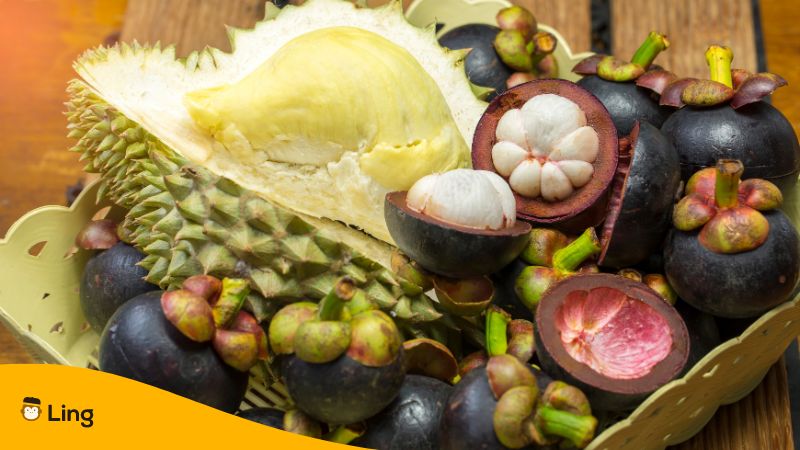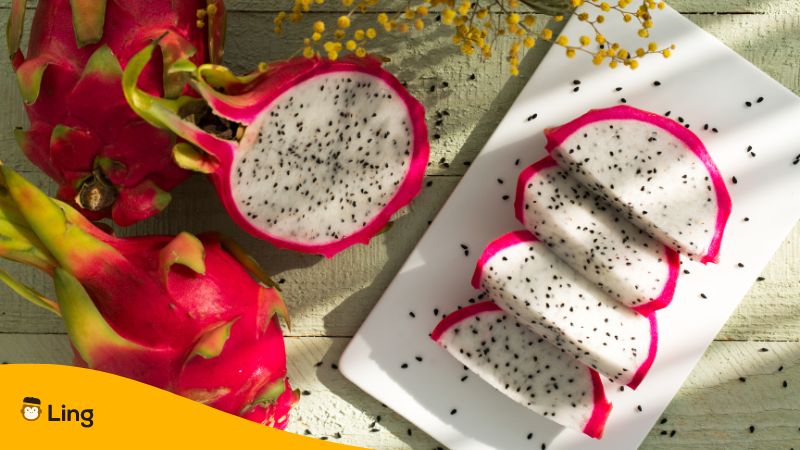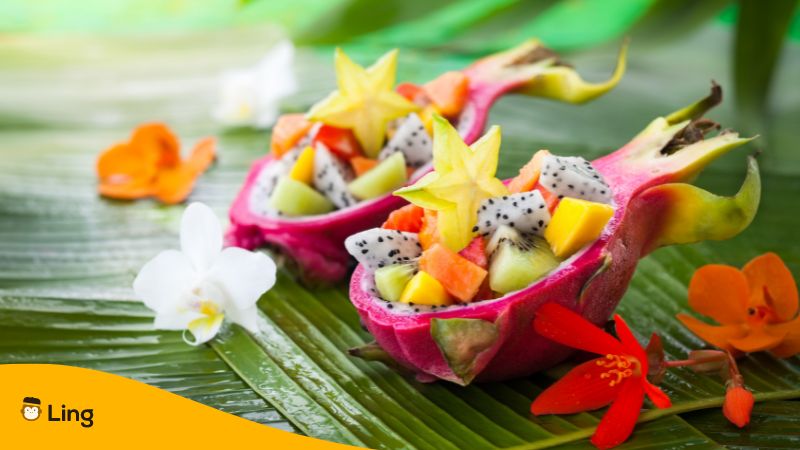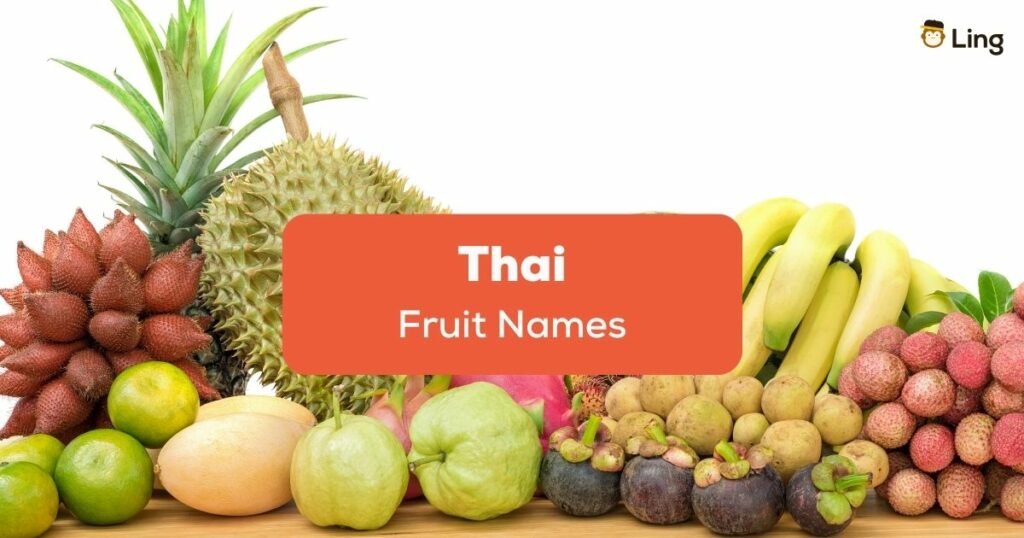It wasn’t too long ago that we discussed the names for different types of meat in the Thai language. Thai food is great and meat usually plays a big role in that. However, there is a whole other side to the world of food in the Kingdom. By that, I mean the world of Thai fruits. There is so much variety available, many of which I had never seen before. To make sure you are better prepared than I was, I wanted to go over some fruit names in Thai. I hope you find something that you love.
The Home Of Tropical Fruit
Could you imagine having a fruit stand just around the corner from your home? At a moment’s notice, you could get your hands on a whole range of sweet, refreshing, and more often than not, local fruits. In Thailand, this is a reality. Well, it is not always a stand – they are sometimes carts that are pushed around – but you get the point. Fruits are an important part of the Thai diet.
If you are familiar with the weather in Thailand, then you know that it is a tropical country that is hot year-round. This, of course, impacts the type of fruit that grows there. While strawberries and blueberries are much harder to come by, watermelon and pineapple are plenty.
Next time you are around (an experience made better by learning Thai), take a look through a menu at your local restaurant. You will find a plate of fruits as an option more often than not. Whether as a breakfast option or for dessert, it remains a popular choice for those with a sweet tooth.
One other thing to mention is how in Thailand, there are two fruits which are given the title of king and queen of fruits respectively. We will be covering them below along with many other Thai fruit names, so keep reading.
Fruit Names In Thai
Before we get too ahead of ourselves, let’s cover how to say fruit in Thai. The word for fruit is “pon la mai” (ผลไม้). When you order one, you will often also be given a small sachet. These are to be used as dips and will differ depending on what you get – they have an option for every flavor you can imagine.
It can range from dried chili powder mixed with salt and sugar (known as “prik glua” or พริกเกลือ) to a concoction of fish sauce, palm sugar and chili (known as “nam phla wan” or น้ำปลาหวาน). These really add a new dimension to the fruit, especially the more sour options, so give them a go and see what you like.
Durian – The King Of Fruits
Let’s start off with the Durian. Called “tu riian” (ทุเรียน) in Thai, this fruit has garnered a bad reputation due to its pungent smell and divisive taste. Just make sure you don’t eat it in enclosed public spaces. You will get bad looks coming your way.

Mangosteen – The Queen Of Fruits
The Mangosteen, or “mang kut” (มังคุด) as it is known in Thai, is another prominent fruit. While they are tough to open up, the sweet white flesh inside tastes great. Just watch out for the seed.
Other Fruits You Will Likely Stumble Upon
While those two take the title of royalty, they are far from all that is available. Here are some more fruit names in Thai to look out for. Think of them as the royal subjects:
Rambutan
The humble rambutan, also called “ngor” (เงาะ) in Thai, are these egg-shaped fruits covered in these long hair-like things. It is easy to eat a lot of these, but the seed inside each really slows you down.
Longan
Longans are quite similar. Called “lam yai” (ลำไย) in Thai, they have a thin outer skin that covers the sweet, translucent interior. If you have tried lychees before, then you should have an idea of what to expect with these.
Watermelon
Who doesn’t love a good Watermelon? Watermelon in Thai is “dtaeng moo” (แตงโม). They are so refreshing in the heat and are quite cheap too. If you are lucky enough to get a super-ripe one, then you will be in heaven.

Dragon Fruit
Then, we have the Dragon Fruit, known as “gaeo mang gorn” (แก้วมังกร) in Thai. As cool as its name is and how it looks, it has a surprisingly mild, maybe evening disappointing flavor. Keep an eye out for both the white and purple flesh varieties.
Mango
As you may already know, Mangoes are ever popular in Thailand, but not the ones we picture in the West. Instead, the “ma muang” (มะม่วง) (the word for mango in Thai) are of the green variety. They are either eaten unripe (which is sour but tastes great with the dips mentioned above) or ripe, which after they turn yellow. This is how it is eaten in the Thai dish “khao niao ma muang” (ข้าวเหนียวมะม่วง).
Jack Fruit
Have you ever seen a whole Jack Fruit before? The Thais call these “ka nuun” (ขนุน). These massive, spiked shells house these smaller round pieces of fruit (which is how they are usually sold) that are, as to be expected, sweet. It may just be me, but they have a very odd smell, arguably worse than that of the Durian.
Guava
The Guava is common in the fruit carts around the country. They are known as “farang” (ฝรั่ง), which also sounds very similar to the word for westerners in Thai. Apparently, this is due to the fact that they are white inside, but I am not sure how true that is. These have a mild bitter/sweet taste.
Papaya
Papaya or “ma la gor” (มะละกอ), is abundant in Thailand. Whether eaten green for som tam (or papaya pok pok) or ripe as a sweet snack, papaya is a major part of Thai cuisine. I highly recommend you give them a try, both in the form of a som tam salad and as fruit on its own.
Pineapple
Of course, no list of fruits in Thailand would not be complete without a mention of Pineapple. In Thai, Pineapples are called “sap bpa rot” (สับปะรด). They are sweet, juicy, and available anywhere. Thailand is also famous for its small pineapples, which are both cuter and sweeter. A must-try, for sure.

Enjoy The World Of Thai Fruits With Ling
You can now tick another important group of Thai vocabulary off your list. I think it is really important to learn words that you will be using often, and fruit names in Thai are likely to be included in that. Whether from the burning street side or in a cool supermarket, you can now feel confident asking for your favorite fruit in Thai.
Want to continue learning about food vocabulary? The Ling Thai app can help you do just that. Learn, test yourself, and grow as you work your way through the thousands of words, dialogue options, and challenges. Download it from Play Store or App Store now!



















